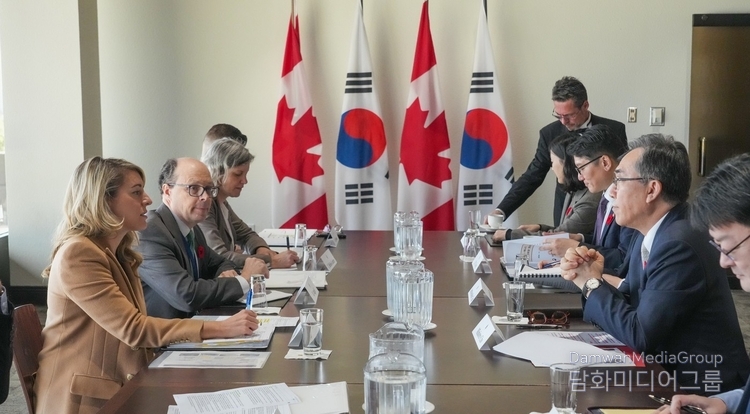By Diplomacy Journal Kayla Lee
Minister of Foreign Affairs Cho Tae-yul, who is visiting Canada to participate in the ROK-Canada Foreign Affairs and Defense (2+2) Ministerial Meeting, held talks with Canadian Foreign Minister Mélanie Joly on Nov. 1 and exchanged views on ways to promote practical cooperation between the two countries, Korean Peninsula issues, and regional and global strategic cooperation.
The two ministers assessed the launch of the 'Korea-Canada Foreign Affairs and Defense (2+2) Ministerial Meeting' as a step forward in the comprehensive strategic partnership between the two countries, and welcomed the decision to make it a regular event and hold it biannually.

Cho emphasized that the groundwork has been laid for the institutionalization of the Security and Defense Partnership, a key pillar of bilateral cooperation, and expressed hope that Canada and South Korea will deepen their reciprocal defense cooperation in the future, including Canada's ongoing project to acquire the next generation of submarines.
In response, Jolie said she is well aware of the excellence of the ROK defense industry, and requested Korea to continue discussing related cooperation as part of the comprehensive security partnership between the two countries.
Cho emphasized that North Korea's recent deployment to Russia and intercontinental ballistic missile (ICBM) provocations are grave violations of UN Security Council resolutions and a serious threat to global peace and security.
Jolie strongly condemned the deployment of North Korean troops to Russia, including military cooperation with Russia, and North Korea's ICBM launch, and pledged to continue to support the ROK government's efforts to realize a denuclearized, free, peaceful, and prosperous unified Korean Peninsula.

Cho praised Canada's co-hosting of the Ministerial Conference on the Humanitarian Aspects of the Official Peace Process in Ukraine with the governments of Norway and Ukraine and the announcement of the Montreal Pledge. Jolie thanked the Republic of Korea for its participation in the conference and for signing the Montreal Pledge.
The two ministers agreed that Canada and South Korea are optimal economic and security partners and will continue to discuss various industrial, energy, and economic security issues through the 2+2 Diplomatic, Industrial, and Economic Security Dialogue.
Joly noted that next year will be the first year that South Korea will import LNG from Canada through the LNG Canada Project, and called for continued cooperation in the natural gas sector.
Minister Cho also introduced the 'EWS Linkage Cooperation Pilot Project at Overseas Missions' to build a resilient supply chain, and said he looks forward to working with Canada. Cho then detailed the difficulties faced by Korean companies investing in Canada and requested that the Canadian government consider amicable solutions, to which Jolie said she would draw the attention of the relevant ministries and hold necessary consultations.
The two ministers also agreed to discuss specific cooperation projects in the Indo-Pacific region through the newly established Korea-Canada Indo-Pacific Dialogue, which they agreed to establish, as Korea and Canada are friends who share universal values and key partners in upholding a norm-based international order.
The two countries also agreed to establish the Korea-Canada Cyber Policy Council to jointly respond to increasingly diversified and sophisticated non-traditional security threats, including cyber and disinformation. The two ministers agreed on the need to actively promote diplomatic and intelligence exchanges and cooperation between the two countries and accelerate negotiations on military/defense classified information protection agreements.
As 2025 will be the year when South Korea and Canada will hold the APEC and G7 chairmanships, respectively, the two ministers agreed to explore various synergies based on the two organizations.
Minister Cho explained the need to expand and modernize the G7 in line with the changing international situation, and suggested identifying areas of strategic cooperation with Canada based on Korea's differentiated strengths such as AI and engagement in the Global South, while Minister Jolie agreed with the need for Korea to participate in the G7 as a global pivotal country, and suggested continuing to work together to this end.







